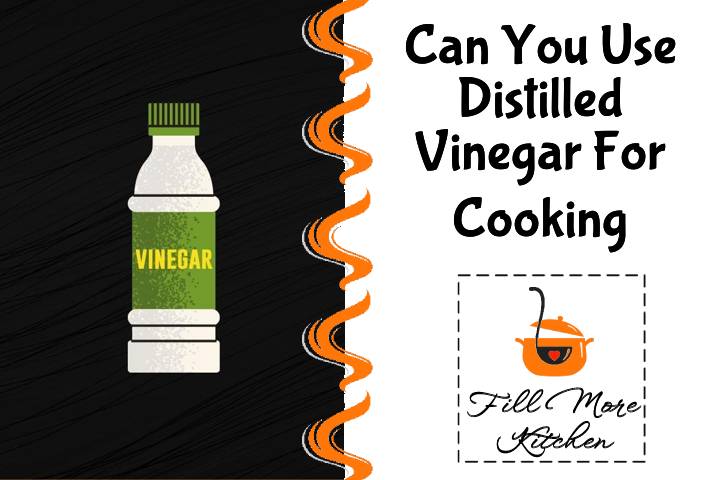Have you ever pondered about the secret behind the tangy sweetness of delicious and tender ribs? Is there any ingredient that can be incorporated into marinades and sauces to impart a kick and tang that will be adored by everyone?
When it comes to cooking, choosing the right type of vinegar is crucial as it can enhance the natural flavors of food and provide a delicate taste; therefore, determining which vinegar is best for each dish is important.
When it comes to cooking, distilled vinegar is a versatile ingredient that can be used in various dishes. Nevertheless, its strong acidic taste and bitter flavors may not complement sweet recipes like salad dressings. Nonetheless, adding enough sugar or honey can balance the bitterness. Distilled vinegar’s antimicrobial properties make it ideal for household cleaning and canning purposes.
If you’re wondering when to use distilled vinegar versus other traditional varieties, we’ve created a concise guide to help you make that decision. Despite the overwhelming number of options available (over 20!), there’s no need to stress – we’ve got you covered!
What’s the Difference Between Distilled and Regular Vinegar?
The process of making distilled vinegar involves distilling white cane sugar in water and fermenting it, while regular vinegar is made by aging water and fruits or other foods for an extended period.
Distilled vinegar, which is also known as white or spirit vinegar, is the most acidic type of vinegar and is highly recommended for preserving food and cleaning household items.
Distilled vinegar has a higher acidic content of up to 20%, in contrast to regular vinegar, which typically contains only 5% or less.
Common types of vinegar such as red wine, apple cider, and honey are aged for long periods of time.
Their method of production is reflected in their names. To illustrate, red wine and white wine vinegar are produced from red and white wine, respectively.
The difference between distilled vinegar and wine is the duration of the aging process. Grapes are left to ferment and turn into alcohol to produce red and white wine, while vinegar undergoes a longer aging process.
Vinegar becomes acidic and antimicrobial as it ages through fermentation.
Distilled vinegar can be produced at home using a process similar to that of kombucha. All you have to do is take a fruit, like apples, and allow them to ferment in a covered container in a dark area.
After a period of three to four weeks, separate the apple pieces from the liquid and let them mature for an additional three to four weeks. You can find a useful, step-by-step guide here on How to Make Apple Cider Vinegar from scraps.
Which Vinegar Is Best For Cooking?
Regular, sweeter, flavored types of vinegar are more suitable for cooking and baking purposes. Distilled vinegar, with its high acidity level, is best used for preserving food and household cleaning tasks.
Common types of vinegar, like apple cider vinegar and wine vinegar, possess a slightly sweet and tangy taste that enhances the flavor of numerous dishes.
Apple cider vinegar is a commonly used type of cooking vinegar that is well-suited for making marinades, particularly for pork dishes like ribs and chops. This vinegar not only imparts a pleasant tangy sweetness to the meat but also helps to tenderize it, resulting in a softer texture.
Wine vinegar can be utilized to enhance the natural flavors of sauteed vegetables and add flavor. It is particularly effective in making marinades and sauteing foods.
Distilled vinegar is a suitable substitute for wine in various cooked recipes and complements Mediterranean dishes exceptionally well.
Balsamic vinegar is produced from grapes and lacks alcoholic content, resulting in a sweet taste that may not be ideal for tangy marinades but is excellent for creating salad dressings and other dressings with a sweeter flavor profile.
How Can You Make Distilled Vinegar?
Distilled vinegar is produced using grain-based alcohol such as vodka, barley, potatoes, or malt, and occasionally wine and beer, although vodka-based alcohol is the more prevalent choice.
Distilled vinegar needs to have a significant amount of acidity to produce acetic acid, which is responsible for its strong taste and ability to fight against microorganisms. This type of acid is obtained from various sources such as corn, potatoes, and other grains or starches.
Distilled vinegar has a bitter and pure taste compared to regular vinegar, which is sweet and may leave a sticky residue when utilized for cleaning purposes. The acetic acid present in distilled vinegar is crucial not only for cleaning but also for preserving vegetables.
When using vinegar for canning, it is important to ensure that the vinegar has a minimum acid value of 5-6% as this serves as a natural preservative and helps to prevent the growth of bacteria that can lead to botulism.
Botulism can grow in canning jars that are not properly sealed or sanitized, as they create an air-tight environment.
By incorporating the acetic acid present in vinegar, the likelihood of botulism growth in canned products can be reduced as it generates an unfavorable and antagonistic atmosphere for bacteria, leading to its eradication from the root cause.
When Is Distilled Vinegar Used In Cooking?
Distilled vinegar is a suitable replacement for vinegar in most recipes. However, if you want to make sweeter marinades or dressings for salads, you may need to add some extra sugar or honey to balance the sour taste. Nevertheless, it can be used as a substitute for apple cider vinegar in meat marinades.
When a recipe requires vinegar, distilled vinegar is not the most desirable flavor for cooking. However, if you are preparing acidic pickled foods like string salad or pickled eggs, then distilled vinegar is the optimal choice among other varieties.
Among the most frequently pickled foods are:
- Cucumbers (pickles)
- Green beans
- Onions
- Jalapenos
- Cabbage
- Tomatoes
- Beets
These snacks are both healthy and flavorful, with pickles and pickled onions being a great addition to summer hamburgers, while jalapenos and tomatoes combine to create a spicy and tangy salsa.
Distilled vinegar is ideal for enhancing the taste of savory dishes because of its strong flavor and acidic properties, although it can also be used in other recipes provided that additional sweeteners are incorporated.
You can also check this video about “Can You Use Distilled Vinegar For Cooking?”
Check out our top 10 reviews!
Related posts
https://fillmorekitchen.com/your-meat-grinder-can-be-used-for-more-than-you-think-you-need-to-try-this/
https://fillmorekitchen.com/are-slow-cooker-liners-safe-to-use/
https://fillmorekitchen.com/can-you-eat-expired-food-if-it-hasnt-been-opened/
https://fillmorekitchen.com/does-chinese-food-contain-gluten-what-to-eat/
https://fillmorekitchen.com/can-you-wash-your-dishes-using-only-water/



